The Best 10 Alternatives to Astra Pentest (+ Pricing & Reviews)
Twingate Team
•
•
Jul 27, 2024

Astra Pentest provides comprehensive security testing services to identify and mitigate vulnerabilities in web applications, networks, and APIs. While Astra Pentest offers robust solutions, it might not be the choice for everyone. This article explores the importance of secure access for distributed workforces.
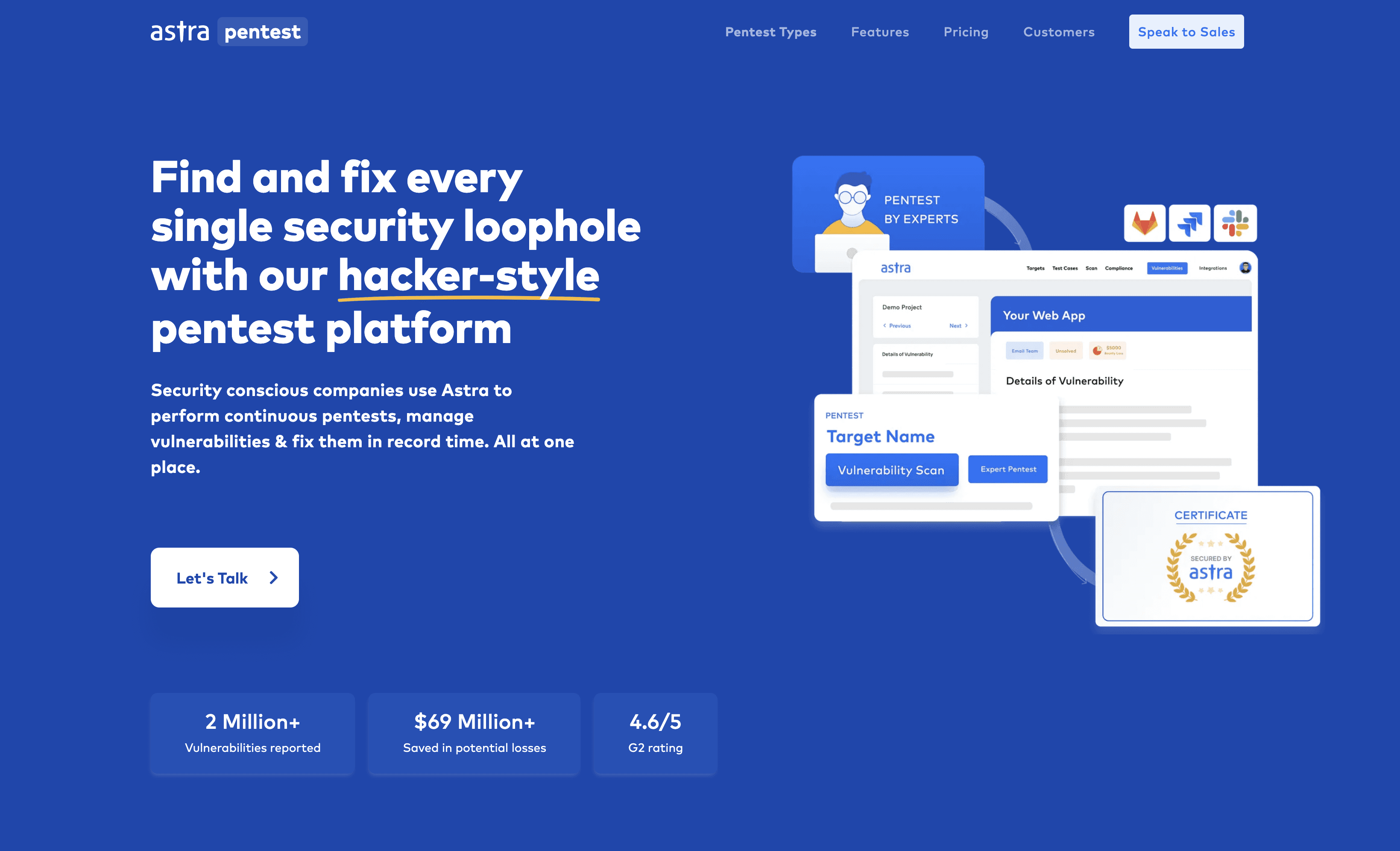
10 Alternatives to Astra Pentest
1. Rubrik
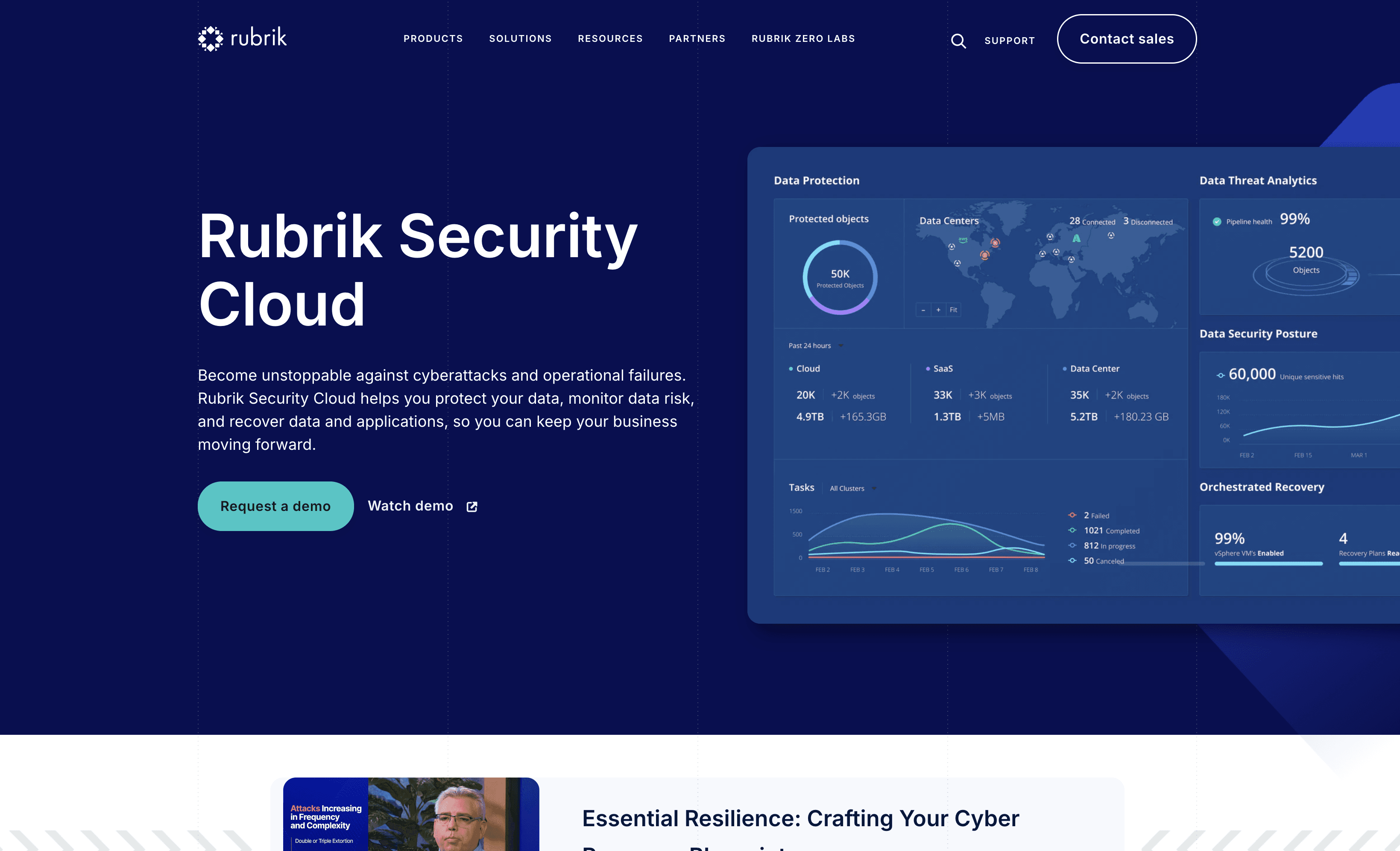
Rubrik is a data security solution designed to protect, monitor, and recover data across enterprise, cloud, and SaaS environments. With features like secure backups, continuous threat monitoring, and cyber recovery, Rubrik aims to ensure business continuity and resilience against cyberattacks and operational failures.
Rubrik Pricing
Rubrik's pricing is not public. Contact their support for more info.
Rubrik Reviews
Rubrik has an overall rating of 4.6 out of 5 stars based on 91 reviews. Users praise its ease of use and reliability. Check out more of our reviews here!
Pros and Cons of Rubrik
Pros:
Rubrik's comprehensive data protection includes air-gapped, immutable, and access-controlled backups, ensuring data security from insider threats and ransomware.
Advanced threat analytics with continuous monitoring and machine learning-based anomaly detection help identify and mitigate data threats like ransomware.
Zero Trust architecture, featuring native immutability, secure protocols, and multi-factor authentication, prevents threats at the data layer.
Cons:
The complexity of Rubrik's solutions may require a significant learning curve for new users to fully understand and utilize all features effectively.
Advanced features and enterprise-level capabilities may come with a higher cost, which could be a consideration for smaller organizations or those with limited budgets.
Integrating Rubrik with existing IT infrastructure and workflows may present challenges, particularly in complex or highly customized environments.
2. Barracuda CloudGen Firewall
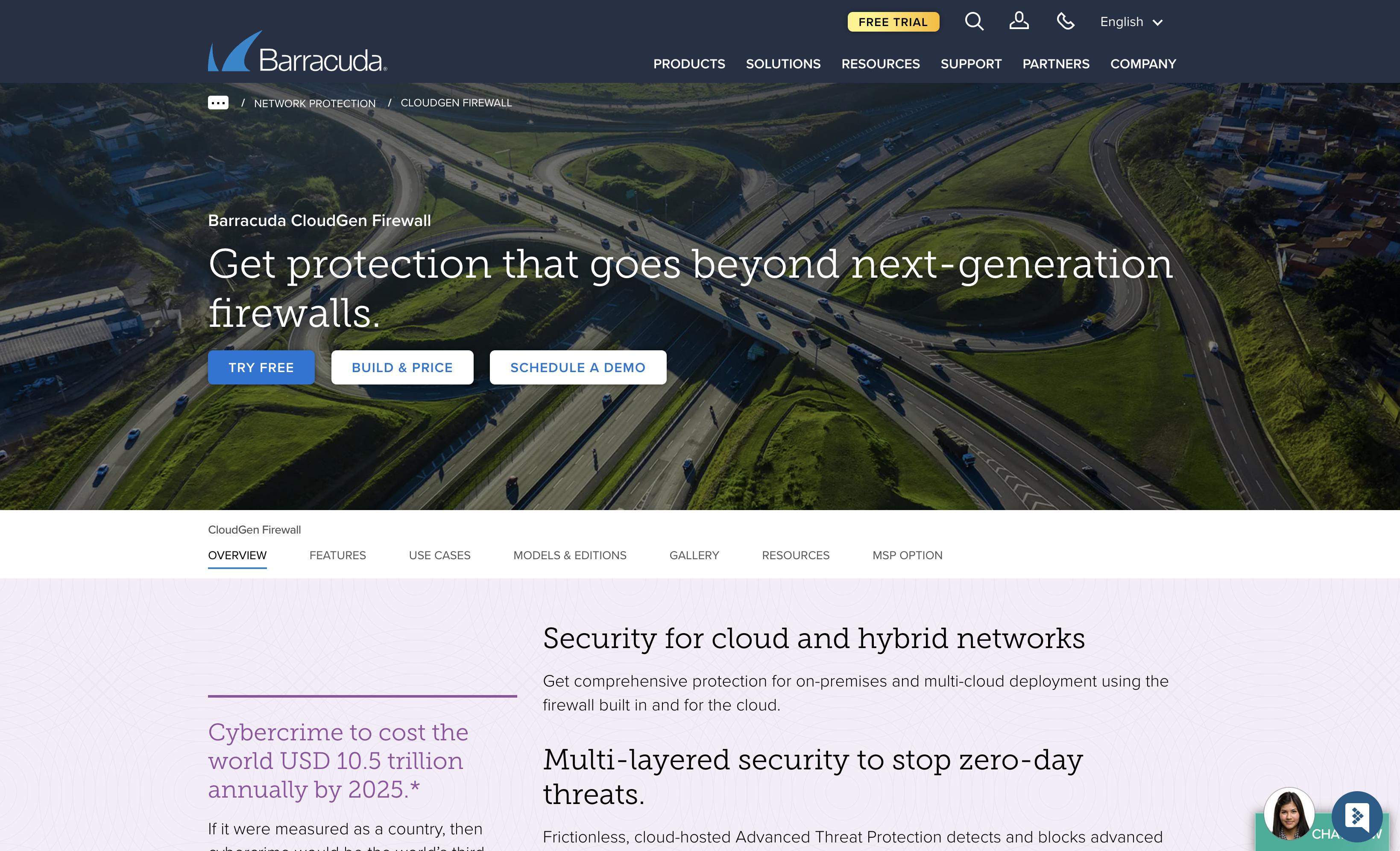
Barracuda CloudGen Firewall is a network security solution designed to protect distributed networks with advanced threat protection and SD-WAN capabilities. It offers centralized management, automated deployment, and seamless integration with cloud services, making it a versatile choice for businesses seeking robust and scalable security.
Barracuda CloudGen Firewall Pricing
Barracuda CloudGen Firewall's pricing is not public. Contact their support for more info.
Barracuda CloudGen Firewall Reviews
Barracuda CloudGen Firewall has an overall rating of 4.5 out of 5 stars based on 42 reviews. Users appreciate its ease of use and centralized management. Check out more of our reviews here!
Pros and Cons ofBarracuda CloudGen Firewall
Pros:
Comprehensive protection for on-premises and multi-cloud deployments, ensuring robust security across diverse environments.
Multi-layered security effectively stops zero-day threats and ransomware, providing advanced threat protection.
Global threat intelligence network offers rapid protection against new threats, leveraging real-time data.
Cons:
Configuration issues can arise, requiring additional time and expertise to resolve effectively.
Dependency issues may complicate integration with existing systems, leading to potential operational challenges.
Difficult learning curve for new users, necessitating extensive training to fully utilize all features.
3. Trend Micro
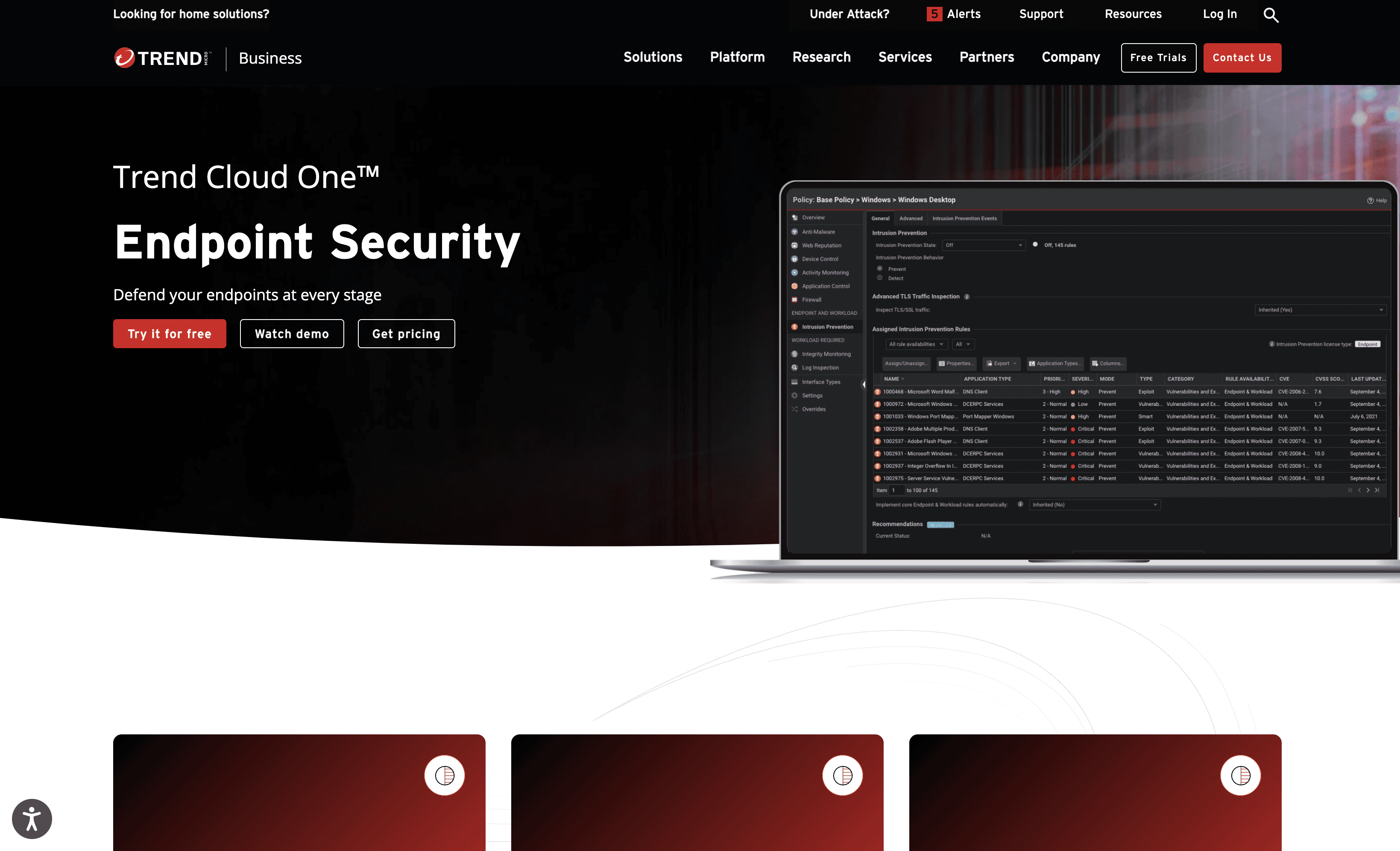
Trend Micro is a cybersecurity solution offering advanced endpoint protection through a single SaaS platform. It provides comprehensive threat prevention, detection, and response, with easy integration into existing security systems. Designed for businesses of all sizes, Trend Micro ensures robust security with minimal setup and unified management.
Trend Micro Pricing
Trend Micro's pricing is not public. Contact their support for more info.
Trend Micro Reviews
Trend Micro has an overall rating of 4.2 out of 5 stars based on 34 reviews. Users appreciate its ease of implementation and robust security features. Check out more of our reviews here!
Pros and Cons of Trend Micro
Pros:
Comprehensive Security Capabilities: Offers a full range of advanced endpoint security features in a single SaaS solution.
Unified Visibility and Management: Provides a unified platform for managing and monitoring security across endpoints.
Smart, Layered Security: Maximizes prevention, detection, and response tailored to different endpoint types.
Cons:
Complexity of Integration: Integrating with existing systems might be challenging for some organizations.
Cost: Comprehensive security solutions can be expensive, which might concern smaller businesses.
Resource Intensive: Advanced features and continuous updates may require significant system resources and bandwidth.
4. Cyberark
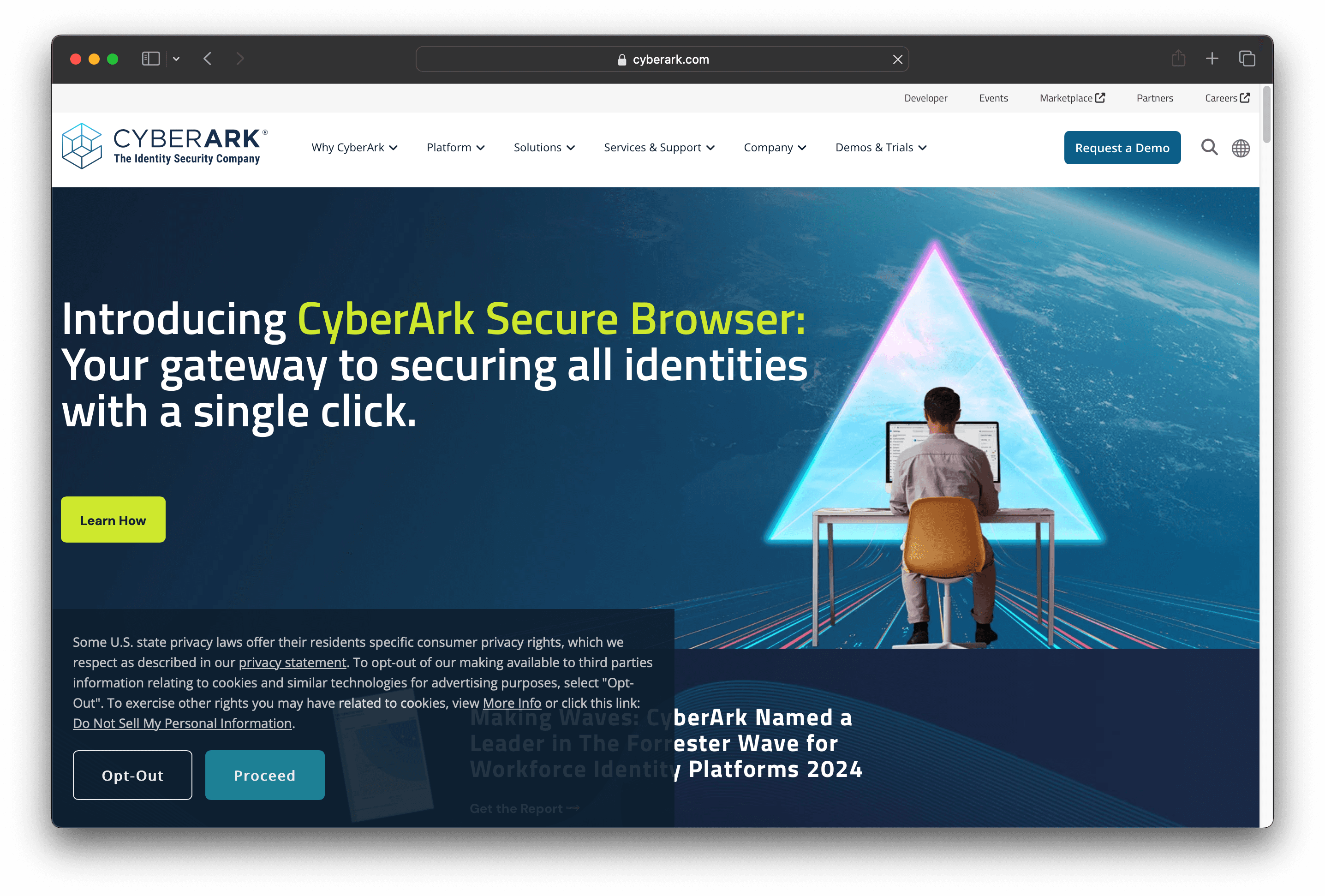
CyberArk is a security solution designed to manage and protect digital identities. It automates access provisioning, simplifies identity processes, and ensures compliance. With a focus on reducing manual tasks, CyberArk aims to streamline identity lifecycle management for businesses of all sizes.
Cyberark Pricing
Cyberark's pricing is not public. Contact their support for more info.
Cyberark Reviews
Cyberark has an overall rating of 4.4 out of 5 stars based on 107 reviews. Users praise its security features and ease of use. Check out more of our reviews here!
Pros and Cons of Cyberark
Pros:
Automated Access Provisioning: Dynamically provision and revoke access to corporate resources, reducing manual intervention and enhancing security.
Identity Orchestration: Simplifies and automates complex identity processes, ensuring seamless integration and management of digital identities.
Compliance Controls: Establishes organization-wide compliance and access attestation controls, providing comprehensive reporting and audit capabilities.
Cons:
Complexity: Implementing and managing a comprehensive identity management system can be complex and require significant resources.
Cost: Advanced identity management solutions can be expensive, both in terms of initial setup and ongoing maintenance.
Integration: Integrating with existing systems and processes might require customization and could be time-consuming.
5. Silver Sky
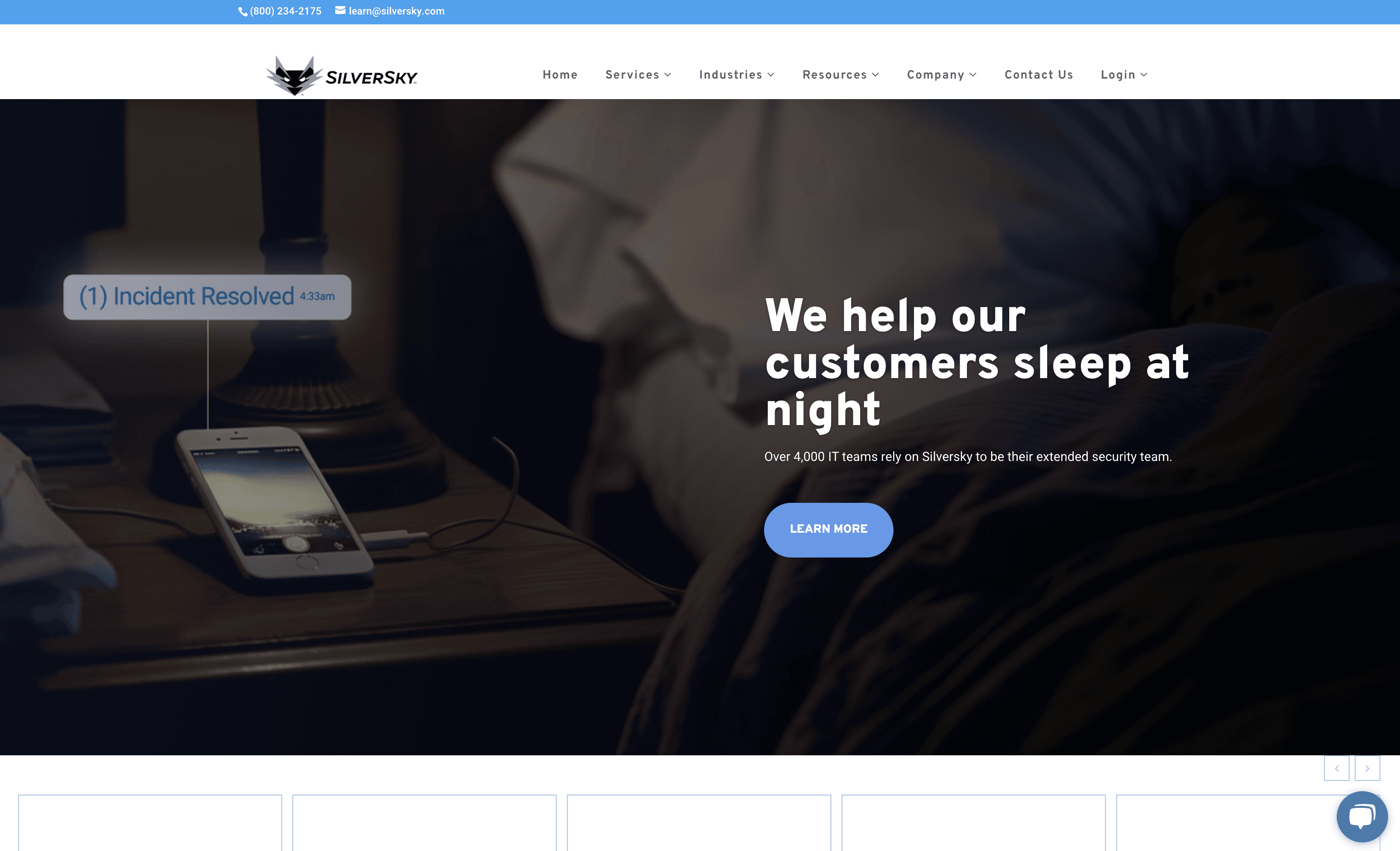
SilverSky is a cybersecurity solution offering Managed Detection and Response (MDR) services. It focuses on email protection, threat response automation, and regulatory compliance. With a commitment to Vision, Velocity, and Vigilance, SilverSky aims to provide robust security for businesses of all sizes.
Silver Sky Pricing
SilverSky's pricing is not public. Contact their support for more info.
Silver Sky Reviews
SilverSky has an overall rating of 4.6 out of 5 stars based on 4 reviews. Users praise its reliability and effective security measures. Check out more of our reviews here!
Pros and Cons of Silver Sky
Pros:
Reliable and Knowledgeable Service: Users appreciate the reliability and expertise of SilverSky's cybersecurity services.
Easy-to-Use Portal: The user-friendly portal offers detailed reports, making it accessible for all users.
Stable Service: Described as very stable, SilverSky's services are used daily without significant issues.
Cons:
Complexity for Small Businesses: The depth and complexity of services might overwhelm smaller organizations with limited IT resources.
Potential Cost: High-level service and 24/7 monitoring might come at a premium price, posing a barrier for smaller companies.
Dependence on Technology: Heavy reliance on advanced technology and automation could pose challenges if technical issues arise.
6. Forcepoint ONE
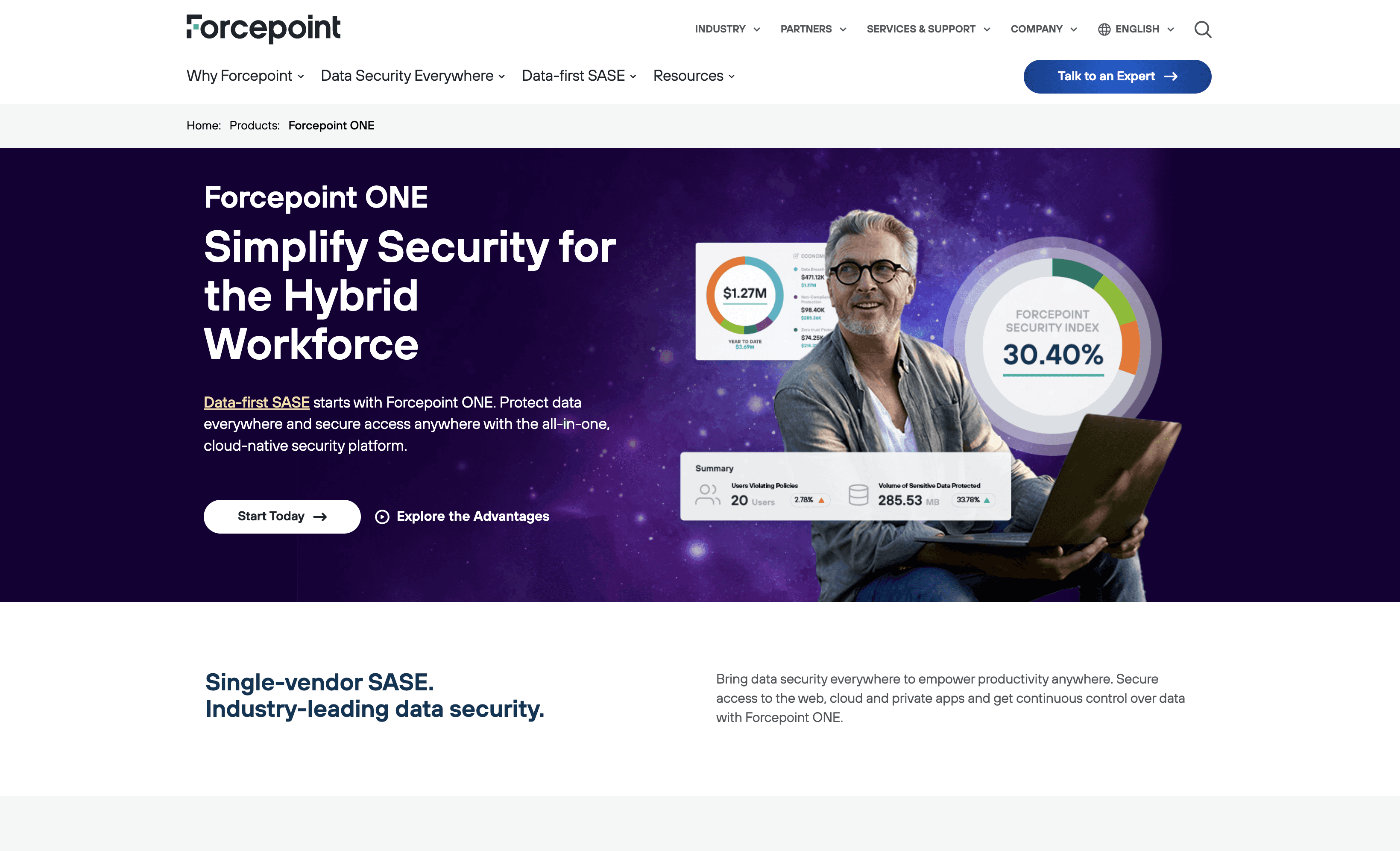
Forcepoint ONE is a cloud-native security platform designed to simplify security for the hybrid workforce. It offers comprehensive protection for data and secure access to applications through a single-vendor SASE solution. With features like CASB, ZTNA, and Web Security, Forcepoint ONE ensures robust security and compliance.
Forcepoint ONE Pricing
Forcepoint ONE's pricing is not public. Contact their support for more info.
Forcepoint ONE Reviews
Forcepoint ONE has an overall rating of 4.2 out of 5 stars based on 21 reviews. Users appreciate its comprehensive features and ease of use. Check out more of our reviews here!
Pros and Cons of Forcepoint ONE
Pros:
Forcepoint ONE's cloud management capabilities streamline security operations, allowing users to manage security policies and monitor threats from a centralized platform.
Customer support is highly rated, providing responsive and knowledgeable assistance to ensure smooth implementation and ongoing use of the platform.
Ease of use is a standout feature, with users praising the intuitive interface and flexible configuration options that simplify security management.
Cons:
Integration with other solutions can be challenging, requiring additional time and expertise to achieve seamless interoperability.
Sync times may be longer than expected, potentially impacting real-time threat detection and response capabilities.
Deployment complexity is a concern, as the initial setup and configuration can be difficult, necessitating significant resources and expertise.
7. Snyk
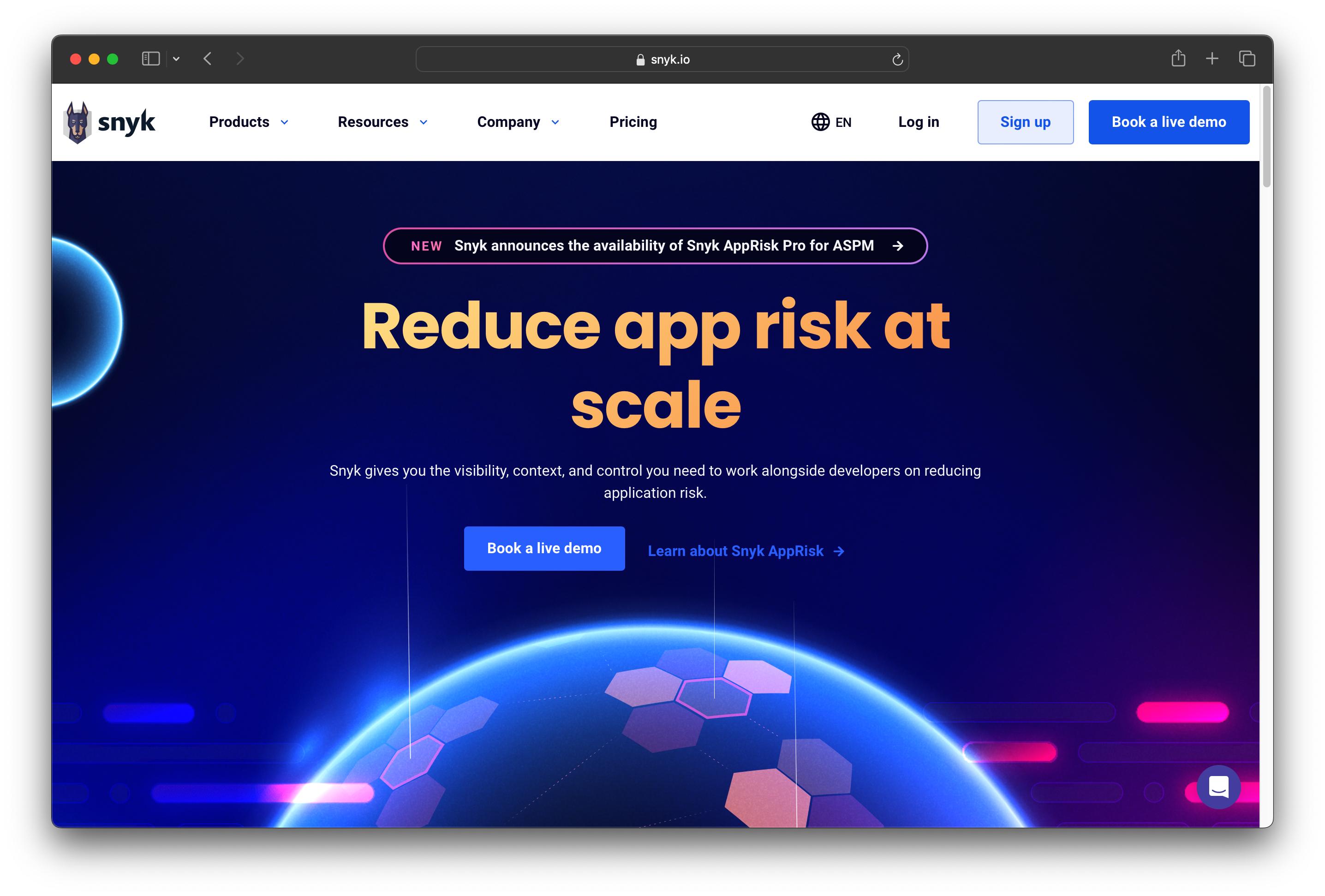
Snyk is a developer-first security platform designed to help developers secure their code and applications. It offers tools for identifying and fixing vulnerabilities in code, open source dependencies, containers, and infrastructure as code. Snyk integrates seamlessly with existing development workflows, providing continuous scanning and actionable fix advice.
Snyk Pricing
Free Plan: $0 per dev/month.
Team Plan: Starting at $25 per month/product.
Enterprise Plan: Contact sales for pricing.
Snyk Reviews
Snyk has an overall rating of 4.5 out of 5 stars based on 121 reviews. Users appreciate its easy integration and vulnerability management. Check out more of our reviews here!
Pros and Cons of Snyk
Pros:
Seamless Integration: Snyk integrates effortlessly with existing IDEs, repositories, and workflows, enhancing developer productivity.
Continuous Monitoring: It continuously scans for vulnerabilities during development, ensuring real-time security.
Actionable Fixes: Provides actionable fix advice and auto PRs for quick merging, streamlining the remediation process.
Cons:
Complexity for New Users: The extensive features and integrations might be overwhelming for new users, requiring a learning curve.
Cost: Advanced features and enterprise solutions might come at a higher cost, potentially limiting accessibility for smaller teams.
False Positives: Reliance on AI for security might raise concerns about false positives, although Snyk claims high accuracy.
8. Illumio
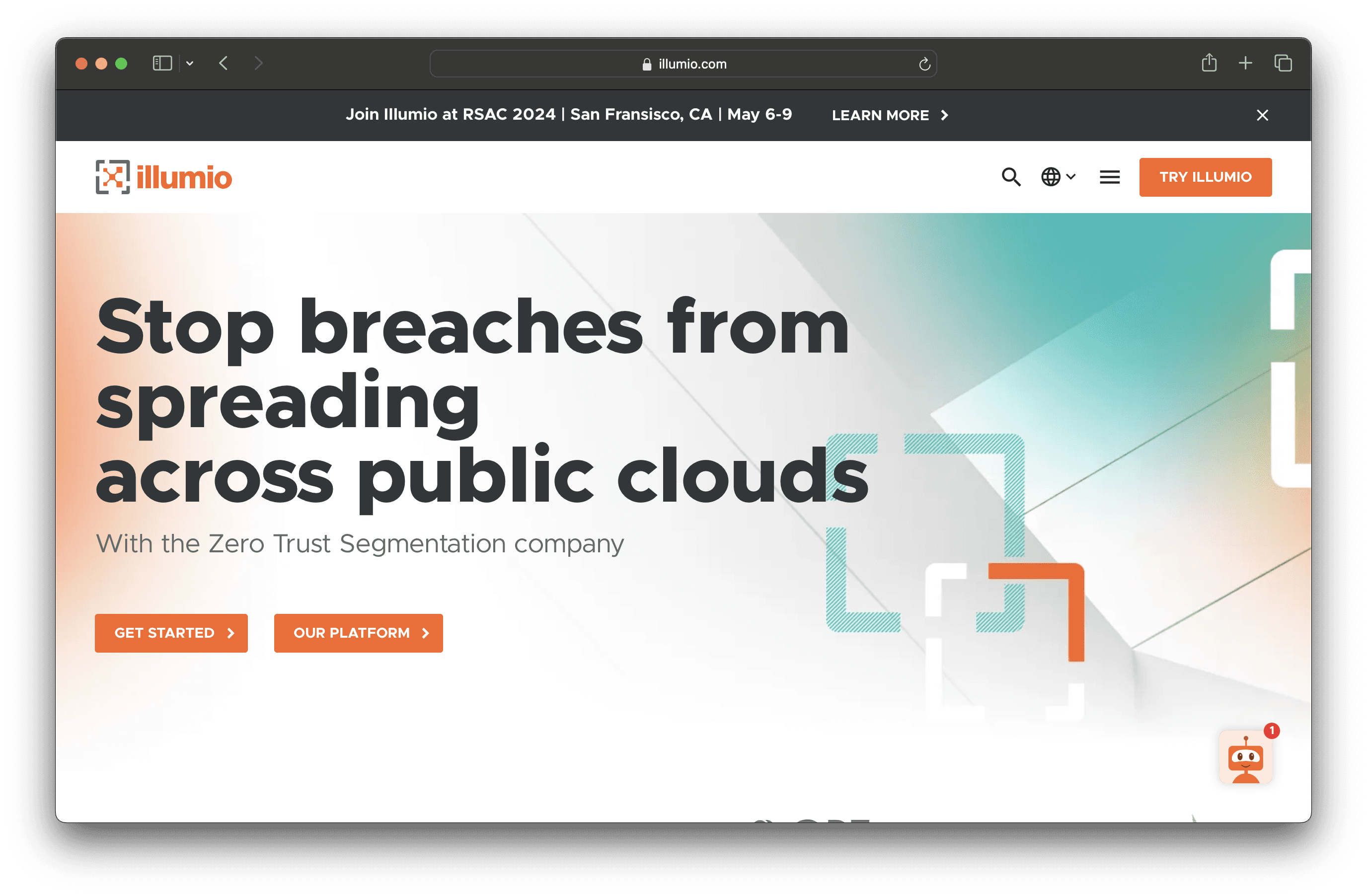
Illumio is a security solution focused on Zero Trust Segmentation, designed to prevent breaches and ransomware from spreading. It offers visibility into communication between workloads and devices, enabling granular segmentation policies. Illumio aims to simplify security for organizations of all sizes, ensuring robust protection with minimal complexity.
Illumio Pricing
Illumio's pricing is not public. Contact their support for more info.
Illumio Reviews
Illumio has an overall rating of 4.5 out of 5 stars based on 12 reviews. Users appreciate its database security and protection from malware threats. Check out more of our reviews here!
Pros and Cons of Illumio
Pros:
Recognized Leader: Illumio is recognized as a leader in The Forrester Wave™: Microsegmentation Solutions, Q3 2024.
Visibility and Action: Provides visibility into environments, allowing for quick, decisive action to contain threats.
Simplified Zero Trust: Simplifies Zero Trust Segmentation by highlighting risks and suggesting policies, making it user-friendly.
Cons:
Expensive: The cost of Illumio's solutions can be high, potentially limiting accessibility for smaller organizations.
Integration Issues: Integrating Illumio with existing systems may present challenges, requiring additional time and expertise.
Learning Curve: The platform's extensive features might require a significant learning curve for new users.
9. Pentera
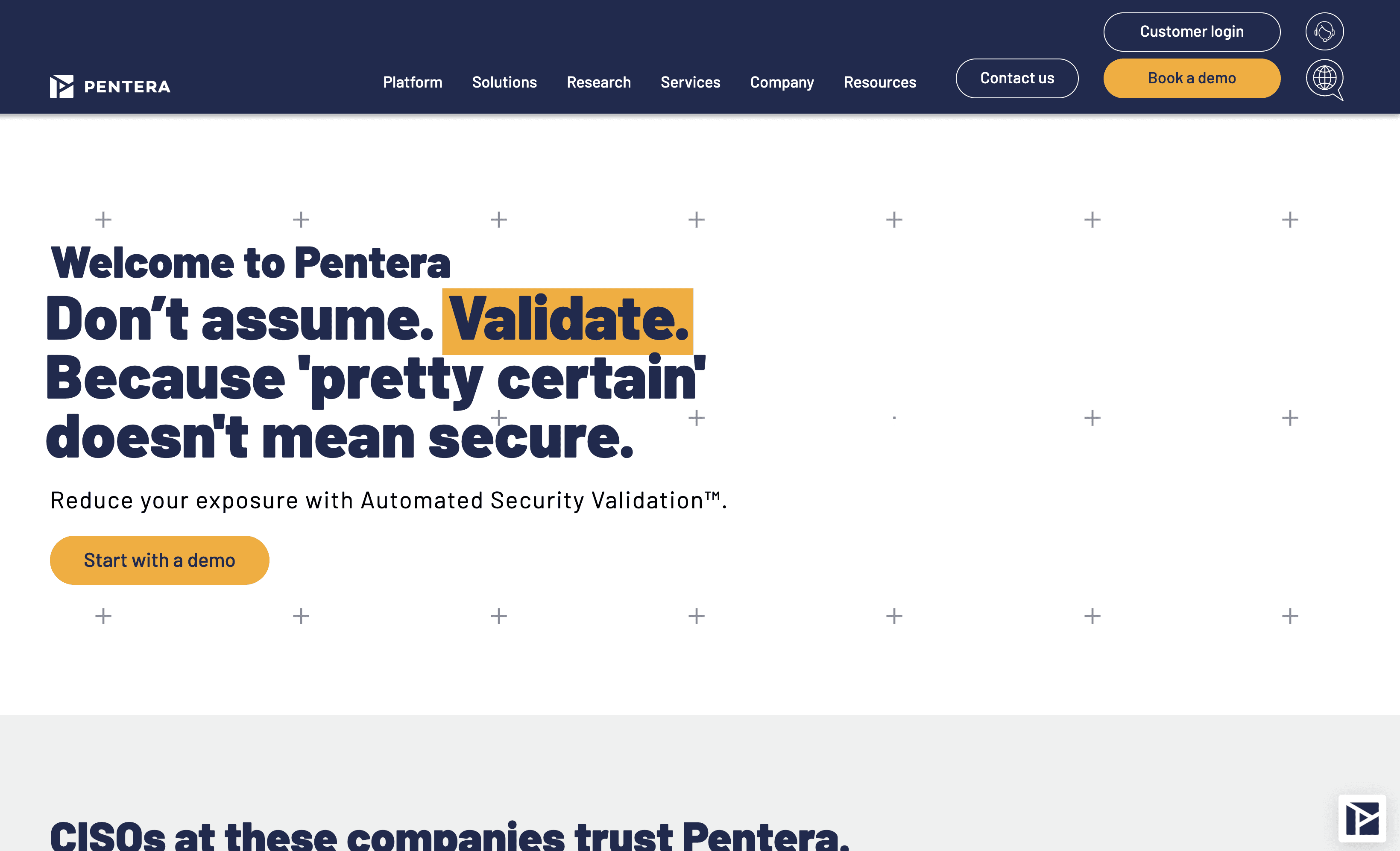
Pentera is an Automated Security Validation platform that continuously tests cybersecurity defenses against the latest attacks. It identifies and prioritizes security gaps, guiding remediation to reduce cyber exposure. Designed for ease of use, Pentera aims to enhance security for businesses of all sizes.
Pentera Pricing
Pentera's pricing is not public. Contact their support for more info.
Pentera Reviews
Pentera has an overall rating of 4.5 out of 5 stars based on 130 reviews. Users appreciate its ease of use and detailed reporting. Check out more of our reviews here!
Pros and Cons of Pentera
Pros:
Automated Security Validation: Pentera automates security validation, reducing manual effort and ensuring continuous protection against evolving threats.
Comprehensive Solutions: Covers Red Teaming, Vulnerability Prioritization, and Ransomware Resilience, offering a holistic approach to cybersecurity.
High Customer Trust: Trusted by CISOs at numerous companies, reflecting a strong reputation and reliability in the industry.
Cons:
Complexity for SMBs: Smaller businesses might find the platform complex and resource-intensive to implement and manage.
Dependence on Automation: Heavy reliance on automation may overlook nuanced security issues requiring human intervention.
Initial Setup and Integration: The initial setup and integration can be challenging and time-consuming, requiring significant resources.
10. Splunk
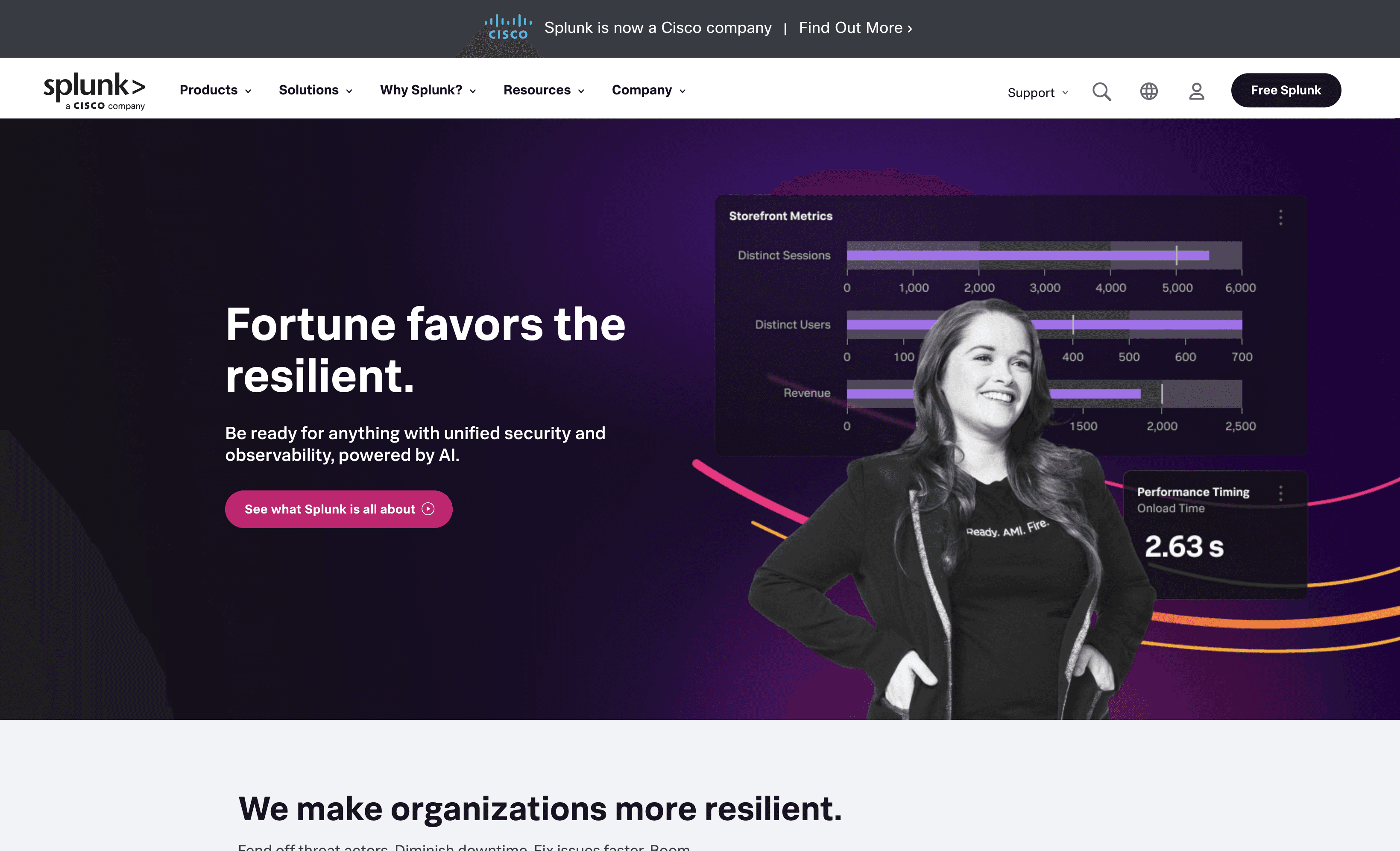
Splunk is a data analytics platform designed to monitor, search, and analyze machine-generated data. It offers real-time insights and operational intelligence, helping businesses enhance security, improve performance, and ensure compliance. With its user-friendly interface and powerful analytics, Splunk aims to simplify data management for organizations of all sizes.
Splunk Pricing
Workload Pricing
Ingest Pricing
Entity Pricing
Activity-based Pricing
Splunk's pricing is not public. Contact their support for more info.
Splunk Reviews
Splunk has an overall rating of 4.3 out of 5 stars based on 36 reviews. Users appreciate its ease of use and robust security features. Check out more of our reviews here!
Pros and Cons of Splunk
Pros:
Ease of Use: Splunk's intuitive interface simplifies data management, making it accessible even for those new to data security software.
Efficiency: Streamlines log and data management, significantly reducing the time required for threat detection and response.
Comprehensive Features: Offers a wide range of tools for monitoring, searching, and analyzing machine-generated data, enhancing overall security and performance.
Cons:
Expensive: The cost of Splunk's solutions can be high, potentially limiting accessibility for smaller organizations.
Pricing Issues: Users have reported concerns about the pricing structure, which may not be transparent or flexible enough for all budgets.
Learning Curve: Despite its ease of use, mastering all of Splunk's features can require significant time and effort, especially for new users.
Looking to secure your technical infrastructure?
Twingate offers granular access controls and deployment automations to protect your VPC environment. By leveraging Zero Trust security tools, Twingate ensures that private resources and internet traffic remain secure in the modern work landscape. Try Twingate for Free today!
Rapidly implement a modern Zero Trust network that is more secure and maintainable than VPNs.
The Best 10 Alternatives to Astra Pentest (+ Pricing & Reviews)
Twingate Team
•
•
Jul 27, 2024

Astra Pentest provides comprehensive security testing services to identify and mitigate vulnerabilities in web applications, networks, and APIs. While Astra Pentest offers robust solutions, it might not be the choice for everyone. This article explores the importance of secure access for distributed workforces.

10 Alternatives to Astra Pentest
1. Rubrik

Rubrik is a data security solution designed to protect, monitor, and recover data across enterprise, cloud, and SaaS environments. With features like secure backups, continuous threat monitoring, and cyber recovery, Rubrik aims to ensure business continuity and resilience against cyberattacks and operational failures.
Rubrik Pricing
Rubrik's pricing is not public. Contact their support for more info.
Rubrik Reviews
Rubrik has an overall rating of 4.6 out of 5 stars based on 91 reviews. Users praise its ease of use and reliability. Check out more of our reviews here!
Pros and Cons of Rubrik
Pros:
Rubrik's comprehensive data protection includes air-gapped, immutable, and access-controlled backups, ensuring data security from insider threats and ransomware.
Advanced threat analytics with continuous monitoring and machine learning-based anomaly detection help identify and mitigate data threats like ransomware.
Zero Trust architecture, featuring native immutability, secure protocols, and multi-factor authentication, prevents threats at the data layer.
Cons:
The complexity of Rubrik's solutions may require a significant learning curve for new users to fully understand and utilize all features effectively.
Advanced features and enterprise-level capabilities may come with a higher cost, which could be a consideration for smaller organizations or those with limited budgets.
Integrating Rubrik with existing IT infrastructure and workflows may present challenges, particularly in complex or highly customized environments.
2. Barracuda CloudGen Firewall

Barracuda CloudGen Firewall is a network security solution designed to protect distributed networks with advanced threat protection and SD-WAN capabilities. It offers centralized management, automated deployment, and seamless integration with cloud services, making it a versatile choice for businesses seeking robust and scalable security.
Barracuda CloudGen Firewall Pricing
Barracuda CloudGen Firewall's pricing is not public. Contact their support for more info.
Barracuda CloudGen Firewall Reviews
Barracuda CloudGen Firewall has an overall rating of 4.5 out of 5 stars based on 42 reviews. Users appreciate its ease of use and centralized management. Check out more of our reviews here!
Pros and Cons ofBarracuda CloudGen Firewall
Pros:
Comprehensive protection for on-premises and multi-cloud deployments, ensuring robust security across diverse environments.
Multi-layered security effectively stops zero-day threats and ransomware, providing advanced threat protection.
Global threat intelligence network offers rapid protection against new threats, leveraging real-time data.
Cons:
Configuration issues can arise, requiring additional time and expertise to resolve effectively.
Dependency issues may complicate integration with existing systems, leading to potential operational challenges.
Difficult learning curve for new users, necessitating extensive training to fully utilize all features.
3. Trend Micro

Trend Micro is a cybersecurity solution offering advanced endpoint protection through a single SaaS platform. It provides comprehensive threat prevention, detection, and response, with easy integration into existing security systems. Designed for businesses of all sizes, Trend Micro ensures robust security with minimal setup and unified management.
Trend Micro Pricing
Trend Micro's pricing is not public. Contact their support for more info.
Trend Micro Reviews
Trend Micro has an overall rating of 4.2 out of 5 stars based on 34 reviews. Users appreciate its ease of implementation and robust security features. Check out more of our reviews here!
Pros and Cons of Trend Micro
Pros:
Comprehensive Security Capabilities: Offers a full range of advanced endpoint security features in a single SaaS solution.
Unified Visibility and Management: Provides a unified platform for managing and monitoring security across endpoints.
Smart, Layered Security: Maximizes prevention, detection, and response tailored to different endpoint types.
Cons:
Complexity of Integration: Integrating with existing systems might be challenging for some organizations.
Cost: Comprehensive security solutions can be expensive, which might concern smaller businesses.
Resource Intensive: Advanced features and continuous updates may require significant system resources and bandwidth.
4. Cyberark

CyberArk is a security solution designed to manage and protect digital identities. It automates access provisioning, simplifies identity processes, and ensures compliance. With a focus on reducing manual tasks, CyberArk aims to streamline identity lifecycle management for businesses of all sizes.
Cyberark Pricing
Cyberark's pricing is not public. Contact their support for more info.
Cyberark Reviews
Cyberark has an overall rating of 4.4 out of 5 stars based on 107 reviews. Users praise its security features and ease of use. Check out more of our reviews here!
Pros and Cons of Cyberark
Pros:
Automated Access Provisioning: Dynamically provision and revoke access to corporate resources, reducing manual intervention and enhancing security.
Identity Orchestration: Simplifies and automates complex identity processes, ensuring seamless integration and management of digital identities.
Compliance Controls: Establishes organization-wide compliance and access attestation controls, providing comprehensive reporting and audit capabilities.
Cons:
Complexity: Implementing and managing a comprehensive identity management system can be complex and require significant resources.
Cost: Advanced identity management solutions can be expensive, both in terms of initial setup and ongoing maintenance.
Integration: Integrating with existing systems and processes might require customization and could be time-consuming.
5. Silver Sky

SilverSky is a cybersecurity solution offering Managed Detection and Response (MDR) services. It focuses on email protection, threat response automation, and regulatory compliance. With a commitment to Vision, Velocity, and Vigilance, SilverSky aims to provide robust security for businesses of all sizes.
Silver Sky Pricing
SilverSky's pricing is not public. Contact their support for more info.
Silver Sky Reviews
SilverSky has an overall rating of 4.6 out of 5 stars based on 4 reviews. Users praise its reliability and effective security measures. Check out more of our reviews here!
Pros and Cons of Silver Sky
Pros:
Reliable and Knowledgeable Service: Users appreciate the reliability and expertise of SilverSky's cybersecurity services.
Easy-to-Use Portal: The user-friendly portal offers detailed reports, making it accessible for all users.
Stable Service: Described as very stable, SilverSky's services are used daily without significant issues.
Cons:
Complexity for Small Businesses: The depth and complexity of services might overwhelm smaller organizations with limited IT resources.
Potential Cost: High-level service and 24/7 monitoring might come at a premium price, posing a barrier for smaller companies.
Dependence on Technology: Heavy reliance on advanced technology and automation could pose challenges if technical issues arise.
6. Forcepoint ONE

Forcepoint ONE is a cloud-native security platform designed to simplify security for the hybrid workforce. It offers comprehensive protection for data and secure access to applications through a single-vendor SASE solution. With features like CASB, ZTNA, and Web Security, Forcepoint ONE ensures robust security and compliance.
Forcepoint ONE Pricing
Forcepoint ONE's pricing is not public. Contact their support for more info.
Forcepoint ONE Reviews
Forcepoint ONE has an overall rating of 4.2 out of 5 stars based on 21 reviews. Users appreciate its comprehensive features and ease of use. Check out more of our reviews here!
Pros and Cons of Forcepoint ONE
Pros:
Forcepoint ONE's cloud management capabilities streamline security operations, allowing users to manage security policies and monitor threats from a centralized platform.
Customer support is highly rated, providing responsive and knowledgeable assistance to ensure smooth implementation and ongoing use of the platform.
Ease of use is a standout feature, with users praising the intuitive interface and flexible configuration options that simplify security management.
Cons:
Integration with other solutions can be challenging, requiring additional time and expertise to achieve seamless interoperability.
Sync times may be longer than expected, potentially impacting real-time threat detection and response capabilities.
Deployment complexity is a concern, as the initial setup and configuration can be difficult, necessitating significant resources and expertise.
7. Snyk

Snyk is a developer-first security platform designed to help developers secure their code and applications. It offers tools for identifying and fixing vulnerabilities in code, open source dependencies, containers, and infrastructure as code. Snyk integrates seamlessly with existing development workflows, providing continuous scanning and actionable fix advice.
Snyk Pricing
Free Plan: $0 per dev/month.
Team Plan: Starting at $25 per month/product.
Enterprise Plan: Contact sales for pricing.
Snyk Reviews
Snyk has an overall rating of 4.5 out of 5 stars based on 121 reviews. Users appreciate its easy integration and vulnerability management. Check out more of our reviews here!
Pros and Cons of Snyk
Pros:
Seamless Integration: Snyk integrates effortlessly with existing IDEs, repositories, and workflows, enhancing developer productivity.
Continuous Monitoring: It continuously scans for vulnerabilities during development, ensuring real-time security.
Actionable Fixes: Provides actionable fix advice and auto PRs for quick merging, streamlining the remediation process.
Cons:
Complexity for New Users: The extensive features and integrations might be overwhelming for new users, requiring a learning curve.
Cost: Advanced features and enterprise solutions might come at a higher cost, potentially limiting accessibility for smaller teams.
False Positives: Reliance on AI for security might raise concerns about false positives, although Snyk claims high accuracy.
8. Illumio

Illumio is a security solution focused on Zero Trust Segmentation, designed to prevent breaches and ransomware from spreading. It offers visibility into communication between workloads and devices, enabling granular segmentation policies. Illumio aims to simplify security for organizations of all sizes, ensuring robust protection with minimal complexity.
Illumio Pricing
Illumio's pricing is not public. Contact their support for more info.
Illumio Reviews
Illumio has an overall rating of 4.5 out of 5 stars based on 12 reviews. Users appreciate its database security and protection from malware threats. Check out more of our reviews here!
Pros and Cons of Illumio
Pros:
Recognized Leader: Illumio is recognized as a leader in The Forrester Wave™: Microsegmentation Solutions, Q3 2024.
Visibility and Action: Provides visibility into environments, allowing for quick, decisive action to contain threats.
Simplified Zero Trust: Simplifies Zero Trust Segmentation by highlighting risks and suggesting policies, making it user-friendly.
Cons:
Expensive: The cost of Illumio's solutions can be high, potentially limiting accessibility for smaller organizations.
Integration Issues: Integrating Illumio with existing systems may present challenges, requiring additional time and expertise.
Learning Curve: The platform's extensive features might require a significant learning curve for new users.
9. Pentera

Pentera is an Automated Security Validation platform that continuously tests cybersecurity defenses against the latest attacks. It identifies and prioritizes security gaps, guiding remediation to reduce cyber exposure. Designed for ease of use, Pentera aims to enhance security for businesses of all sizes.
Pentera Pricing
Pentera's pricing is not public. Contact their support for more info.
Pentera Reviews
Pentera has an overall rating of 4.5 out of 5 stars based on 130 reviews. Users appreciate its ease of use and detailed reporting. Check out more of our reviews here!
Pros and Cons of Pentera
Pros:
Automated Security Validation: Pentera automates security validation, reducing manual effort and ensuring continuous protection against evolving threats.
Comprehensive Solutions: Covers Red Teaming, Vulnerability Prioritization, and Ransomware Resilience, offering a holistic approach to cybersecurity.
High Customer Trust: Trusted by CISOs at numerous companies, reflecting a strong reputation and reliability in the industry.
Cons:
Complexity for SMBs: Smaller businesses might find the platform complex and resource-intensive to implement and manage.
Dependence on Automation: Heavy reliance on automation may overlook nuanced security issues requiring human intervention.
Initial Setup and Integration: The initial setup and integration can be challenging and time-consuming, requiring significant resources.
10. Splunk

Splunk is a data analytics platform designed to monitor, search, and analyze machine-generated data. It offers real-time insights and operational intelligence, helping businesses enhance security, improve performance, and ensure compliance. With its user-friendly interface and powerful analytics, Splunk aims to simplify data management for organizations of all sizes.
Splunk Pricing
Workload Pricing
Ingest Pricing
Entity Pricing
Activity-based Pricing
Splunk's pricing is not public. Contact their support for more info.
Splunk Reviews
Splunk has an overall rating of 4.3 out of 5 stars based on 36 reviews. Users appreciate its ease of use and robust security features. Check out more of our reviews here!
Pros and Cons of Splunk
Pros:
Ease of Use: Splunk's intuitive interface simplifies data management, making it accessible even for those new to data security software.
Efficiency: Streamlines log and data management, significantly reducing the time required for threat detection and response.
Comprehensive Features: Offers a wide range of tools for monitoring, searching, and analyzing machine-generated data, enhancing overall security and performance.
Cons:
Expensive: The cost of Splunk's solutions can be high, potentially limiting accessibility for smaller organizations.
Pricing Issues: Users have reported concerns about the pricing structure, which may not be transparent or flexible enough for all budgets.
Learning Curve: Despite its ease of use, mastering all of Splunk's features can require significant time and effort, especially for new users.
Looking to secure your technical infrastructure?
Twingate offers granular access controls and deployment automations to protect your VPC environment. By leveraging Zero Trust security tools, Twingate ensures that private resources and internet traffic remain secure in the modern work landscape. Try Twingate for Free today!
Rapidly implement a modern Zero Trust network that is more secure and maintainable than VPNs.
The Best 10 Alternatives to Astra Pentest (+ Pricing & Reviews)
Twingate Team
•
•
Jul 27, 2024

Astra Pentest provides comprehensive security testing services to identify and mitigate vulnerabilities in web applications, networks, and APIs. While Astra Pentest offers robust solutions, it might not be the choice for everyone. This article explores the importance of secure access for distributed workforces.

10 Alternatives to Astra Pentest
1. Rubrik

Rubrik is a data security solution designed to protect, monitor, and recover data across enterprise, cloud, and SaaS environments. With features like secure backups, continuous threat monitoring, and cyber recovery, Rubrik aims to ensure business continuity and resilience against cyberattacks and operational failures.
Rubrik Pricing
Rubrik's pricing is not public. Contact their support for more info.
Rubrik Reviews
Rubrik has an overall rating of 4.6 out of 5 stars based on 91 reviews. Users praise its ease of use and reliability. Check out more of our reviews here!
Pros and Cons of Rubrik
Pros:
Rubrik's comprehensive data protection includes air-gapped, immutable, and access-controlled backups, ensuring data security from insider threats and ransomware.
Advanced threat analytics with continuous monitoring and machine learning-based anomaly detection help identify and mitigate data threats like ransomware.
Zero Trust architecture, featuring native immutability, secure protocols, and multi-factor authentication, prevents threats at the data layer.
Cons:
The complexity of Rubrik's solutions may require a significant learning curve for new users to fully understand and utilize all features effectively.
Advanced features and enterprise-level capabilities may come with a higher cost, which could be a consideration for smaller organizations or those with limited budgets.
Integrating Rubrik with existing IT infrastructure and workflows may present challenges, particularly in complex or highly customized environments.
2. Barracuda CloudGen Firewall

Barracuda CloudGen Firewall is a network security solution designed to protect distributed networks with advanced threat protection and SD-WAN capabilities. It offers centralized management, automated deployment, and seamless integration with cloud services, making it a versatile choice for businesses seeking robust and scalable security.
Barracuda CloudGen Firewall Pricing
Barracuda CloudGen Firewall's pricing is not public. Contact their support for more info.
Barracuda CloudGen Firewall Reviews
Barracuda CloudGen Firewall has an overall rating of 4.5 out of 5 stars based on 42 reviews. Users appreciate its ease of use and centralized management. Check out more of our reviews here!
Pros and Cons ofBarracuda CloudGen Firewall
Pros:
Comprehensive protection for on-premises and multi-cloud deployments, ensuring robust security across diverse environments.
Multi-layered security effectively stops zero-day threats and ransomware, providing advanced threat protection.
Global threat intelligence network offers rapid protection against new threats, leveraging real-time data.
Cons:
Configuration issues can arise, requiring additional time and expertise to resolve effectively.
Dependency issues may complicate integration with existing systems, leading to potential operational challenges.
Difficult learning curve for new users, necessitating extensive training to fully utilize all features.
3. Trend Micro

Trend Micro is a cybersecurity solution offering advanced endpoint protection through a single SaaS platform. It provides comprehensive threat prevention, detection, and response, with easy integration into existing security systems. Designed for businesses of all sizes, Trend Micro ensures robust security with minimal setup and unified management.
Trend Micro Pricing
Trend Micro's pricing is not public. Contact their support for more info.
Trend Micro Reviews
Trend Micro has an overall rating of 4.2 out of 5 stars based on 34 reviews. Users appreciate its ease of implementation and robust security features. Check out more of our reviews here!
Pros and Cons of Trend Micro
Pros:
Comprehensive Security Capabilities: Offers a full range of advanced endpoint security features in a single SaaS solution.
Unified Visibility and Management: Provides a unified platform for managing and monitoring security across endpoints.
Smart, Layered Security: Maximizes prevention, detection, and response tailored to different endpoint types.
Cons:
Complexity of Integration: Integrating with existing systems might be challenging for some organizations.
Cost: Comprehensive security solutions can be expensive, which might concern smaller businesses.
Resource Intensive: Advanced features and continuous updates may require significant system resources and bandwidth.
4. Cyberark

CyberArk is a security solution designed to manage and protect digital identities. It automates access provisioning, simplifies identity processes, and ensures compliance. With a focus on reducing manual tasks, CyberArk aims to streamline identity lifecycle management for businesses of all sizes.
Cyberark Pricing
Cyberark's pricing is not public. Contact their support for more info.
Cyberark Reviews
Cyberark has an overall rating of 4.4 out of 5 stars based on 107 reviews. Users praise its security features and ease of use. Check out more of our reviews here!
Pros and Cons of Cyberark
Pros:
Automated Access Provisioning: Dynamically provision and revoke access to corporate resources, reducing manual intervention and enhancing security.
Identity Orchestration: Simplifies and automates complex identity processes, ensuring seamless integration and management of digital identities.
Compliance Controls: Establishes organization-wide compliance and access attestation controls, providing comprehensive reporting and audit capabilities.
Cons:
Complexity: Implementing and managing a comprehensive identity management system can be complex and require significant resources.
Cost: Advanced identity management solutions can be expensive, both in terms of initial setup and ongoing maintenance.
Integration: Integrating with existing systems and processes might require customization and could be time-consuming.
5. Silver Sky

SilverSky is a cybersecurity solution offering Managed Detection and Response (MDR) services. It focuses on email protection, threat response automation, and regulatory compliance. With a commitment to Vision, Velocity, and Vigilance, SilverSky aims to provide robust security for businesses of all sizes.
Silver Sky Pricing
SilverSky's pricing is not public. Contact their support for more info.
Silver Sky Reviews
SilverSky has an overall rating of 4.6 out of 5 stars based on 4 reviews. Users praise its reliability and effective security measures. Check out more of our reviews here!
Pros and Cons of Silver Sky
Pros:
Reliable and Knowledgeable Service: Users appreciate the reliability and expertise of SilverSky's cybersecurity services.
Easy-to-Use Portal: The user-friendly portal offers detailed reports, making it accessible for all users.
Stable Service: Described as very stable, SilverSky's services are used daily without significant issues.
Cons:
Complexity for Small Businesses: The depth and complexity of services might overwhelm smaller organizations with limited IT resources.
Potential Cost: High-level service and 24/7 monitoring might come at a premium price, posing a barrier for smaller companies.
Dependence on Technology: Heavy reliance on advanced technology and automation could pose challenges if technical issues arise.
6. Forcepoint ONE

Forcepoint ONE is a cloud-native security platform designed to simplify security for the hybrid workforce. It offers comprehensive protection for data and secure access to applications through a single-vendor SASE solution. With features like CASB, ZTNA, and Web Security, Forcepoint ONE ensures robust security and compliance.
Forcepoint ONE Pricing
Forcepoint ONE's pricing is not public. Contact their support for more info.
Forcepoint ONE Reviews
Forcepoint ONE has an overall rating of 4.2 out of 5 stars based on 21 reviews. Users appreciate its comprehensive features and ease of use. Check out more of our reviews here!
Pros and Cons of Forcepoint ONE
Pros:
Forcepoint ONE's cloud management capabilities streamline security operations, allowing users to manage security policies and monitor threats from a centralized platform.
Customer support is highly rated, providing responsive and knowledgeable assistance to ensure smooth implementation and ongoing use of the platform.
Ease of use is a standout feature, with users praising the intuitive interface and flexible configuration options that simplify security management.
Cons:
Integration with other solutions can be challenging, requiring additional time and expertise to achieve seamless interoperability.
Sync times may be longer than expected, potentially impacting real-time threat detection and response capabilities.
Deployment complexity is a concern, as the initial setup and configuration can be difficult, necessitating significant resources and expertise.
7. Snyk

Snyk is a developer-first security platform designed to help developers secure their code and applications. It offers tools for identifying and fixing vulnerabilities in code, open source dependencies, containers, and infrastructure as code. Snyk integrates seamlessly with existing development workflows, providing continuous scanning and actionable fix advice.
Snyk Pricing
Free Plan: $0 per dev/month.
Team Plan: Starting at $25 per month/product.
Enterprise Plan: Contact sales for pricing.
Snyk Reviews
Snyk has an overall rating of 4.5 out of 5 stars based on 121 reviews. Users appreciate its easy integration and vulnerability management. Check out more of our reviews here!
Pros and Cons of Snyk
Pros:
Seamless Integration: Snyk integrates effortlessly with existing IDEs, repositories, and workflows, enhancing developer productivity.
Continuous Monitoring: It continuously scans for vulnerabilities during development, ensuring real-time security.
Actionable Fixes: Provides actionable fix advice and auto PRs for quick merging, streamlining the remediation process.
Cons:
Complexity for New Users: The extensive features and integrations might be overwhelming for new users, requiring a learning curve.
Cost: Advanced features and enterprise solutions might come at a higher cost, potentially limiting accessibility for smaller teams.
False Positives: Reliance on AI for security might raise concerns about false positives, although Snyk claims high accuracy.
8. Illumio

Illumio is a security solution focused on Zero Trust Segmentation, designed to prevent breaches and ransomware from spreading. It offers visibility into communication between workloads and devices, enabling granular segmentation policies. Illumio aims to simplify security for organizations of all sizes, ensuring robust protection with minimal complexity.
Illumio Pricing
Illumio's pricing is not public. Contact their support for more info.
Illumio Reviews
Illumio has an overall rating of 4.5 out of 5 stars based on 12 reviews. Users appreciate its database security and protection from malware threats. Check out more of our reviews here!
Pros and Cons of Illumio
Pros:
Recognized Leader: Illumio is recognized as a leader in The Forrester Wave™: Microsegmentation Solutions, Q3 2024.
Visibility and Action: Provides visibility into environments, allowing for quick, decisive action to contain threats.
Simplified Zero Trust: Simplifies Zero Trust Segmentation by highlighting risks and suggesting policies, making it user-friendly.
Cons:
Expensive: The cost of Illumio's solutions can be high, potentially limiting accessibility for smaller organizations.
Integration Issues: Integrating Illumio with existing systems may present challenges, requiring additional time and expertise.
Learning Curve: The platform's extensive features might require a significant learning curve for new users.
9. Pentera

Pentera is an Automated Security Validation platform that continuously tests cybersecurity defenses against the latest attacks. It identifies and prioritizes security gaps, guiding remediation to reduce cyber exposure. Designed for ease of use, Pentera aims to enhance security for businesses of all sizes.
Pentera Pricing
Pentera's pricing is not public. Contact their support for more info.
Pentera Reviews
Pentera has an overall rating of 4.5 out of 5 stars based on 130 reviews. Users appreciate its ease of use and detailed reporting. Check out more of our reviews here!
Pros and Cons of Pentera
Pros:
Automated Security Validation: Pentera automates security validation, reducing manual effort and ensuring continuous protection against evolving threats.
Comprehensive Solutions: Covers Red Teaming, Vulnerability Prioritization, and Ransomware Resilience, offering a holistic approach to cybersecurity.
High Customer Trust: Trusted by CISOs at numerous companies, reflecting a strong reputation and reliability in the industry.
Cons:
Complexity for SMBs: Smaller businesses might find the platform complex and resource-intensive to implement and manage.
Dependence on Automation: Heavy reliance on automation may overlook nuanced security issues requiring human intervention.
Initial Setup and Integration: The initial setup and integration can be challenging and time-consuming, requiring significant resources.
10. Splunk

Splunk is a data analytics platform designed to monitor, search, and analyze machine-generated data. It offers real-time insights and operational intelligence, helping businesses enhance security, improve performance, and ensure compliance. With its user-friendly interface and powerful analytics, Splunk aims to simplify data management for organizations of all sizes.
Splunk Pricing
Workload Pricing
Ingest Pricing
Entity Pricing
Activity-based Pricing
Splunk's pricing is not public. Contact their support for more info.
Splunk Reviews
Splunk has an overall rating of 4.3 out of 5 stars based on 36 reviews. Users appreciate its ease of use and robust security features. Check out more of our reviews here!
Pros and Cons of Splunk
Pros:
Ease of Use: Splunk's intuitive interface simplifies data management, making it accessible even for those new to data security software.
Efficiency: Streamlines log and data management, significantly reducing the time required for threat detection and response.
Comprehensive Features: Offers a wide range of tools for monitoring, searching, and analyzing machine-generated data, enhancing overall security and performance.
Cons:
Expensive: The cost of Splunk's solutions can be high, potentially limiting accessibility for smaller organizations.
Pricing Issues: Users have reported concerns about the pricing structure, which may not be transparent or flexible enough for all budgets.
Learning Curve: Despite its ease of use, mastering all of Splunk's features can require significant time and effort, especially for new users.
Looking to secure your technical infrastructure?
Twingate offers granular access controls and deployment automations to protect your VPC environment. By leveraging Zero Trust security tools, Twingate ensures that private resources and internet traffic remain secure in the modern work landscape. Try Twingate for Free today!
Solutions
Solutions
The VPN replacement your workforce will love.
Solutions